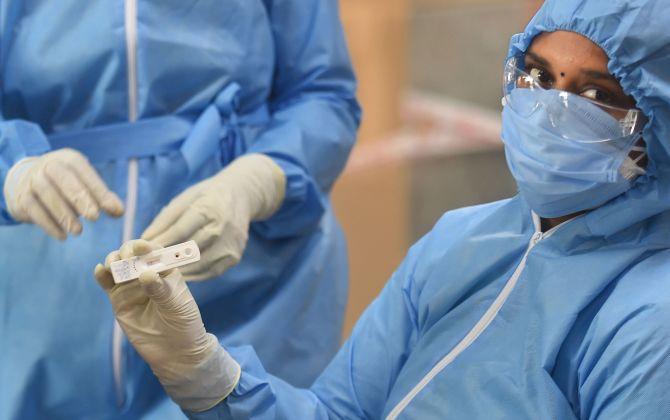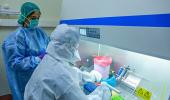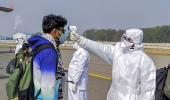The Indian Council of Medical Research (ICMR) on Monday asked the states and Union Territories to stop using the rapid antibody COVID-19 testing kits procured from China due to 'wide variation' in their performance even as the government said not a single rupee will be lost as payments were not made to the Chinese suppliers of the equipment.

India procured around 5 lakh rapid antibody test kits from the two Chinese firms, Guongzhou Wondfo Biotech and Livzon Diagnostics, and they were distributed to several states reporting rising cases of the coronavirus infection.
The ICMR's directive to states and UTs to not use the kits came in the midst of Congress leader Rahul Gandhi's allegations that some people were indulging in profiteering from the immeasurable suffering of millions.
He urged Prime Minister Narendra Modi to intervene and take immediate strict action against the wrong-doers.
In a communication to chief secretaries of all states and union territories, the ICMR asked them to stop using the kits saying it found 'wide variation' in effectiveness of the equipment supplied by the two Chinese firms despite promise of good performance.
It asked the states and UTs to return the kits so that they can be sent back to the suppliers.
"The ICMR has not made any payment in respect of these supplies. Because of the due process followed (not going for procurement with 100 per cent advance amount), Government of India does not stand to lose a single rupee," the health ministry said.
In an order last week, the Delhi high court fixed the price of the antibody test kits at Rs 400 each as against Rs 600 approved by the ICMR.
The ruling came on a plea by two companies, Rare Metabolics Life Sciences Pvt Ltd and Aark Pharmaceuticals, which had entered into an agreement with Matrix Labs, for distribution of the kits in India. Matrix Lab is the the importer of the kits.
The two companies approached the court after Matrix sought full payment for the kits before delivering them, according to details submitted in the court.
The Congress cited media reports about the test kits being sold to the government at around 150 per cent profit. Congress chief spokesperson Randeep Surjewala also said it was "shameful and inhuman" that people were supplying test kits bought for Rs 225 at Rs 600 to the state exchequer.
In a fact sheet on the issue, the government said it had conducted a tender process to procure the kits and the evaluation committee received four bids of Rs 1,204, Rs 1,200, Rs 844 and Rs 600.
Accordingly, bid offer of Rs 600 was considered as it was the lowest.
An official said cancellation of the orders from the Chinese firms will not have any financial bearing on the government.
The government said the procurement was undertaken when there was a huge demand for the test kits globally and various countries were applying their "full might", monetary and diplomatic, to acquire them.
The government said the ICMR also tried to procure the kits directly from Wondfo in China but the quotation received for direct procurement had a number of issues including a condition for making 100 per cent direct payment as advance without any guarantees.
It said there was no commitment on timelines and rates were communicated in US dollars without any clause for accounting for fluctuations in prices.
'Hence, it was decided to go for Wondfo's exclusive distributor for India for the kit who quoted an all inclusive price for FOB (logistics) without any clause for advance,' it said.
The government had decided to procure rapid antibody testing kits as the regular tests (RT-PCR) take longer time.
A number of states including Rajasthan and West Bengal complained about the quality of the test kits, following which the ICMR asked them to temporarily not use them.
'Based on scientific assessment of their performance, the order in question (Wondfo) along with order in respect of another make found under-performing have been cancelled,' the government said.
The ICMR, in its communication to states and UTs, said it 'evaluated the kits of Guangzhou Wondfo Biotech and Zhuhai Livson Diagnostics in field conditions. The results have shown wide variation in their sensitivity, despite early promise of good performance for surveillance purpose'.
The ICMR advisory advocated that-PCR throat/nasal swab test is the best use for diagnosis of COVID-19.
The-PCR test detects the virus early and is the best strategy to identify and isolate the individual, the advisory said.
A senior official said that due process was followed in finalising tenders for purchase the kits from China.
The official also clarified that there is sufficient number of testing kits available to carry out-PCR tests for COVID-19 as per the government's testing strategy.
Last week, the two Chinese pharma companies said they are ready to cooperate with Indian agencies looking into the allegations of poor accuracy of their kits.
In separate statements, Guongzhou Wondfo Biotech and Livzon Diagnostics said they follow strict quality control of their products asserting that specified guidelines must be followed in storage of the kits as well as in their usages to get accurate results.












 © 2025
© 2025